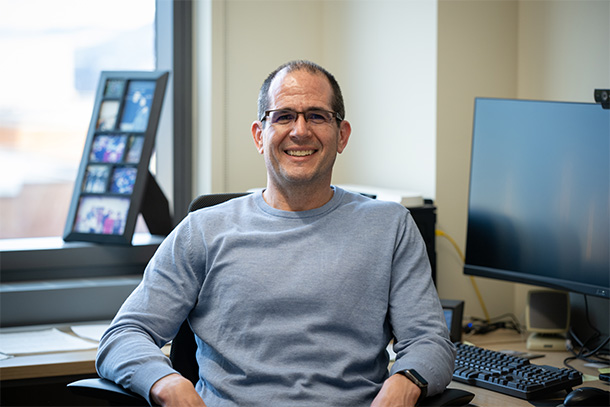
Keefe Manning, Penn State professor of biomedical engineering with a courtesy appointment as a professor of surgery, was elected fellow of the American Heart Association by the association's stroke council. Credit: Poornima Tomy/Penn State.
Keefe Manning elected American Heart Association Fellow
Dec 9, 2024
By Sarah Small
UNIVERSITY PARK, Pa. — As a high school student, Keefe Manning became aware of the American Heart Association (AHA) and the importance of research and service related to cardiovascular diseases when he helped his mother with a local AHA Heart Ball in northwest Houston.
“That is when I first appreciated the impact that AHA has on our society,” said Manning, professor of biomedical engineering with a courtesy appointment as a professor of surgery at Penn State.
Now, after years of research related to cardiovascular devices, the appreciation for AHA that helped start Manning on his career path has come full circle, as he recently was elected fellow of the AHA by the AHA’s stroke council. Fellowship status in the AHA recognizes scientific achievements and service related to cardiovascular and stroke research, according to the AHA website.
“Receiving fellow status in the American Heart Association is quite an honor,” Manning said. “I have been involved with the American Heart Association since high school, but more importantly, I have dedicated my career to addressing cardiovascular disease through basic research and providing opportunities for trainees — for example, undergraduate and graduate students — to perform cardiovascular research.”
Manning’s research focuses on developing and improving cardiovascular devices, understanding blood clotting and creating opportunities for junior researchers to study cardiovascular disease. In particular, he focuses on the fluid dynamics associated with device-induced clotting.
“The early part of my career was studying the fluid mechanics associated with mechanical heart valves and its impact on blood damage,” Manning said. “Currently, my group continues to develop pediatric and adult mechanical circulatory support devices with the Penn State Hershey Medical Center where we specifically perform experimental studies and computational simulations to understand the potential for clotting. Another part of my research is in acute ischemic stroke, research for which I currently have a National Institutes of Health grant.”
Manning uses both experimental and computational methods in his research for purposes such as creating a thrombus growth model, predicting embolus trajectory, understanding platelet/fibrin adhesion to biomaterial surfaces and predicting embolization. His group also works with the U.S. Food and Drug Administration to develop guidelines for characterizing blood-contacting technology and has established benchmark data through his collection of experimental data.
In addition to his pursuit of improving cardiovascular devices through his own research, Manning has contributed to the mentoring and training of future cardiovascular scientists. He serves as the director of the Summer Translational Cardiovascular Science Institute. In this role, he has assisted with providing more than 50 students the opportunity to conduct summer research in a number of cardiovascular-focused labs at Penn State with many pursuing training or employment in the cardiovascular area.
“One of the exciting things about being at Penn State is how many opportunities exist for both research and education of the next generation of researchers in this field,” Manning said. “Penn State also has so many faculty working on this topic, which enables important collaborations. I hope we can build on existing University-wide collaborations, as well as create new ones, in this field. Penn State is well positioned to address cardiovascular disease through research, something that excites me as I look to the future.”
Manning joined Penn State in 2001 as a postdoctoral scholar before being hired as an assistant professor in 2004. Prior to joining Penn State, Manning earned his doctorate in biomedical engineering at the Virginia Commonwealth University and both his bachelor’s and master’s degrees in bioengineering from Texas A&M University. A member of multiple professional societies, Manning has served on multiple review committees and boards and published more than 100 papers in peer-reviewed journals. He is a fellow of the American Institute for Medical and Biological Engineering, the American Society of Mechanical Engineers and the Biomedical Engineering Society.
“Keefe’s work is a prime example of bridging the gap between academic research and applications,” said Dan Hayes, head of the Department of Biomedical Engineering and Dorothy Foehr Huck and J. Lloyd Huck Chair in Nanotherapeutics and Regenerative Medicine. “His impactful research has the potential to improve cardiovascular devices and the lives of those who rely on them. His recognition by the American Heart Association in naming him a fellow is well deserved.”

